Advertising disclosure:
Our partners compensate us. This may influence which products or services we review (also where and how those products appear on the site), this in no way affects our recommendations or the advice we offer. Our reviews are based on years of experience and countless hours of research. Our partners cannot pay us to guarantee favorable reviews of their products or services.
In 2024, businesses must continually adapt and innovate to stay ahead of the curve. A crucial aspect of this process is the implementation of a robust omnichannel marketing strategy. As a marketer, you understand the challenges and complexities involved in creating seamless customer experiences across various touchpoints. In this comprehensive guide, we will delve into the critical aspects of omnichannel marketing, its impact on marketplace businesses, and the considerations necessary for selecting the most suitable platform to drive success and growth.
Our objective is to equip you with the knowledge and insights required to make informed decisions when navigating the dynamic world of ecommerce. We will examine the benefits of implementing an omnichannel marketing platform, explore essential features and integrations, and provide a step-by-step approach for evaluating and choosing the right platform tailored to your specific needs. By embracing these principles, you will be well on your way to establishing a dominant presence in the marketplace and fostering long-lasting relationships with your customers.
How to Choose the Right Omnichannel Marketing Platform for Your Marketplace Business:
- Understanding Omnichannel Marketing
- Omnichannel Marketing Statistics that Show the Importance of Omnichannel Marketing
- A Step-by-Step Guide to Choosing the Best Omnichannel Marketing Platform for Your Needs
- 1. Pacvue Commerce
- 2. Perpetua
- 3. CommerceIQ
- 4. Teikametrics
- 5. Optiwise.ai
- Frequently Asked Questions
Understanding Omnichannel Marketing
Omnichannel marketing involves the integration of various channels, such as email, social media, mobile apps, physical stores, and online marketplaces, to provide a seamless experience for customers. The goal of omnichannel marketing is to create a cohesive and consistent brand experience across all touchpoints, regardless of whether the customer is interacting with the brand online or offline.
One of the benefits of omnichannel marketing is that it allows businesses to engage with customers in a more personalized and targeted manner. By leveraging data and analytics, businesses can understand the customer's behavior and preferences across various channels and use this information to provide relevant and personalized content and offers. This not only helps to improve customer engagement but also increases the chances of converting prospects into customers and retaining existing customers.
The benefits of utilizing omnichannel marketing platforms in your brand campaigns
Omnichannel marketing is becoming increasingly important as customers interact with brands on multiple channels and devices. An omnichannel marketing platform helps businesses unify their marketing channels and simplify the omnichannel marketing approach. With the right tools, businesses can keep their messaging consistent, provide a personalized user experience based on past interactions, and work with multiple channels in one platform.
Implementing an omnichannel marketing platform offers numerous benefits to businesses, including:
- Improved customer experience: With an omnichannel marketing platform, businesses can provide customers with a seamless experience across all channels. Customers interact with brands on multiple channels and devices, and businesses that fail to meet customer expectations risk losing significant sales opportunities. Omnichannel marketing centers around the customer and their journey to purchase. By improving their experience, businesses can increase customer loyalty and turn them into brand fans. According to a study, 89% of customers get frustrated when they need to repeat their concerns to multiple customer service representatives. With an omnichannel marketing platform, businesses can eliminate this frustration and provide customers with a seamless experience across all channels.
- Unified data: An omnichannel marketing platform helps businesses unify their data from multiple platforms, which provides better insights into customer behavior and marketing performance. Instead of having data silos from disparate customer touchpoints, businesses can unify their data, which helps them gain better insights. Organizing data from multiple platforms helps businesses better understand their customers and improve their marketing performance. In fact, a recent study found that companies with strong omnichannel customer engagement strategies retained an average of 89% of their customers, compared to 33% for companies with weak omnichannel strategies.
- Personalized communications: By unifying customer data, businesses can personalize their communications to make their message more relevant to their audience, improving conversions. Personalization makes your message more relevant to your audience, which can improve conversions. According to a source, personalized emails have a 29% higher open rate and 41% higher click-through rate than non-personalized emails. An omnichannel marketing platform helps businesses provide a personalized user experience based on past interactions with customers.
- More effective lead nurturing: An omnichannel marketing platform allows for more effective lead nurturing by interacting with the customer at every stage of their buyer’s journey. Businesses can use their data to draw users from awareness to consideration to purchase, increasing their chances of conversion.
- Increased return on investment (ROI): Implementing an omnichannel marketing platform offers numerous benefits to businesses, including increased ROI. With an omnichannel marketing platform, businesses can improve their marketing performance, provide a better customer experience, and personalize communications, leading to higher conversion rates and increased revenue.
- Saves valuable time and resources: Omnichannel marketing is a complex process that requires significant time and resources. An omnichannel marketing platform helps businesses simplify the omnichannel marketing approach, allowing them to save valuable time and resources.
- Provides consistent messaging: An omnichannel marketing platform helps businesses keep their messaging consistent across all channels, which reinforces their brand message and creates a more cohesive customer experience.
- Provides a personalized user experience based on past interactions: An omnichannel marketing platform allows businesses to provide a personalized user experience based on past interactions with customers. By unifying customer data from multiple channels, businesses can provide a seamless experience across all channels.
- Works with multiple channels in one platform: An omnichannel marketing platform allows businesses to work with multiple channels in one platform, which simplifies the marketing process and makes it easier to manage campaigns across multiple channels.
- Eliminates customer frustration: By providing a seamless experience across all channels, an omnichannel marketing platform eliminates customer frustration and ensures a positive customer experience.
- Improves customer loyalty: With a personalized user experience, businesses can improve customer loyalty and turn customers into brand fans. When customers feel valued and understood, they are more likely to become loyal customers, repeat buyers, and brand advocates. A study by Harvard Business Review found that customers who had the best past experiences spend 140% more compared to those who had the poorest past experience.
- Provides better insights on customers and marketing performance: Unifying customer data from multiple channels provides businesses with a 360-degree view of their customers. This information helps businesses understand their customers better, identify their preferences, and adjust their marketing strategies accordingly. By tracking marketing performance across all channels, businesses can identify what’s working and what’s not, and make data-driven decisions to improve their marketing efforts.
- Increases chances of conversion and annual revenue: By providing a seamless experience across all channels, personalizing communications, and nurturing leads effectively, businesses increase their chances of conversion and annual revenue. According to a source, companies with strong omnichannel customer engagement strategies see a 9.5% year-over-year increase in annual revenue.
Omnichannel Marketing Statistics that Show the Importance of Omnichannel Marketing
1. Retailers who don’t sell on multiple channels miss out on up to 30% of sales Retailers who do not meet omnichannel shopping expectations miss out on a significant number of sales opportunities. Research suggests that retailers lose anywhere between 10% and 30% of sales by not offering a seamless omnichannel experience.
2. Using 3+ channels increases order rate by 494% Marketing campaigns that utilize at least three channels are much more effective than those launched on just one channel. Reports show that campaigns with an omnichannel approach result in a 494% higher order rate compared to campaigns launched on just one channel.
3. Mobile sales will be 10.4% of all retail transactions by 2025 eMarketer predicts that mobile commerce will make up 10.4% of total retail transactions by 2025, up from 5.9% currently. Total mobile sales are expected to continue increasing each year and reach 44% of total ecommerce sales, hitting $488 billion in a single year.
A Step-by-Step Guide to Choosing the Best Omnichannel Marketing Platform for Your Needs
With so many options available in the market, it can be challenging to know where to start when choosing an omnichannel marketing platform. Here is a step-by-step guide to help you choose the right platform for your ecommerce business:
Step 1: Define Your Needs
The first step is to define your needs and goals. What channels do you want to market on? What features do you need in an omnichannel marketing platform? Do you need automation, customization, and scalability? Answering these questions will help you narrow down your search and find the right platform that meets your needs.
Step 2: Research Available Options
Once you've defined your needs and goals, research available options. Look for platforms that support the marketplaces and channels you want to market on. Read reviews, case studies, and testimonials from other businesses to see how they have benefited from using the platform.
Step 3: Evaluate Features and Integrations
Evaluate the features and integrations each platform offers. Look for platforms that provide automated bidding, keyword research, ad management, inventory management, and reporting. Make sure the platform integrates with the marketplaces and channels you want to market on.
Step 4: Consider Pricing Plans and Scalability
Consider the pricing plans and scalability of each platform. Look for platforms that offer flexible pricing plans that fit your budget and business needs. Make sure the platform can scale with your business as it grows.
Step 5: Assess Customer Support and Training
Assess the level of customer support and training each platform provides. Look for platforms that offer 24/7 customer support, live chat, phone support, and email support. Make sure the platform provides training and resources to help you get started and use the platform effectively.
Step 6: Trial the Platform
Once you've narrowed down your options, trial the platform. Most platforms offer free trials or demos, allowing you to test the platform's features and capabilities before committing. Make sure the platform meets your needs and works seamlessly with your business.
Step 7: Evaluate ROI and Performance
Finally, evaluate the platform's ROI and performance regularly. Track your marketing activities, sales, and revenue to see how the platform is impacting your business. Make adjustments as needed to optimize your marketing strategy and maximize your ROI.
5 Omnichannel Marketing Platforms to Help You Optimize Marketplaces Ads
1. Pacvue Commerce
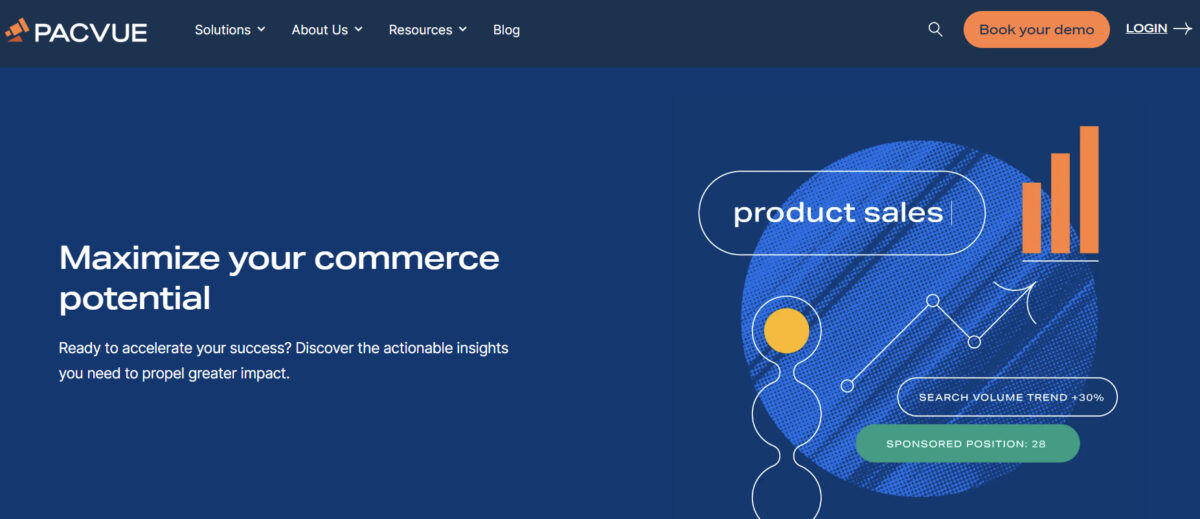
Pacvue is an omnichannel advertising platform that helps businesses manage and optimize their advertising campaigns on marketplaces such as Amazon, Walmart, Kroger, Bol.com, Etsy, and more. It offers features such as automated bidding, keyword research, ad management, and reporting. Pacvue also offers integrations with popular advertising platforms such as Google Ads and Facebook Ads. The platform provides businesses with real-time data and insights to help them make data-driven decisions and improve their advertising performance.
2. Perpetua
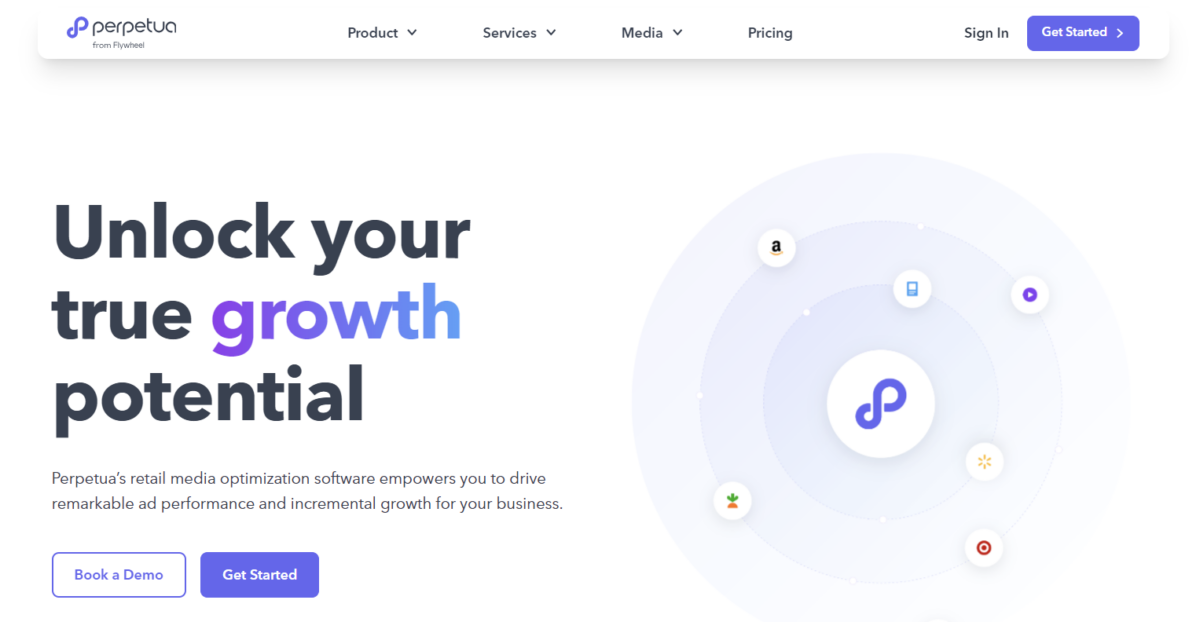
Perpetua is an omnichannel advertising platform that helps businesses manage and optimize their advertising campaigns on Amazon, Instacart, and Walmart. It offers features such as automated bidding, campaign management, and reporting. Perpetua uses machine learning algorithms to optimize campaigns and improve advertising performance. The platform also offers integrations with popular advertising platforms such as Google Ads and Facebook Ads. Perpetua provides businesses with real-time data and insights to help them make data-driven decisions and improve their advertising performance.
3. CommerceIQ
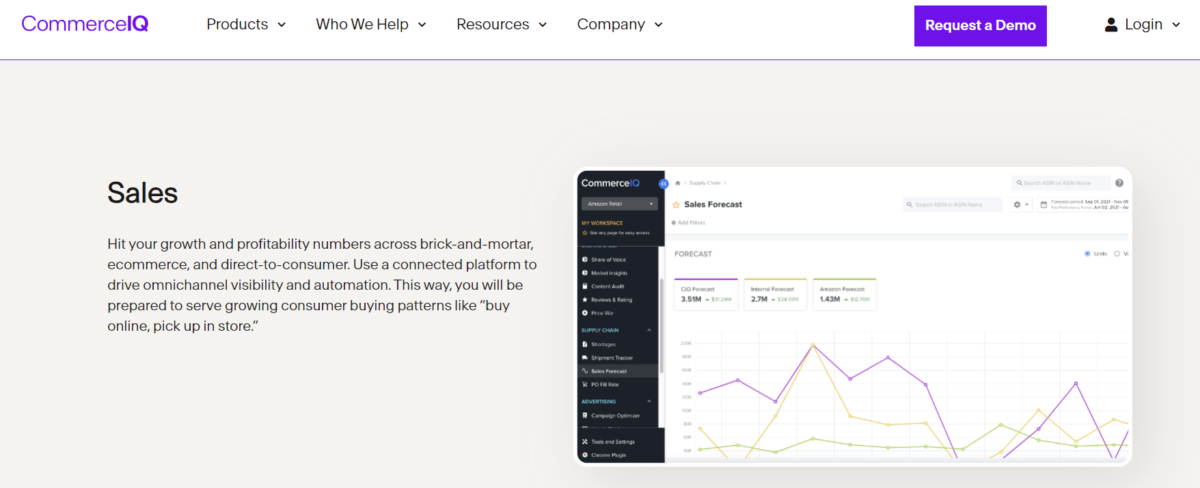
CommerceIQ is an omnichannel ecommerce platform that helps businesses manage and optimize their sales and marketing activities on Amazon. It offers features such as product analytics, automated pricing, inventory management, and advertising management. CommerceIQ uses artificial intelligence and machine learning algorithms to optimize campaigns and improve advertising performance. The platform also offers integrations with popular ecommerce platforms such as Shopify, Magento, and WooCommerce. CommerceIQ provides businesses with real-time data and insights to help them make data-driven decisions and improve their ecommerce performance.
4. Teikametrics
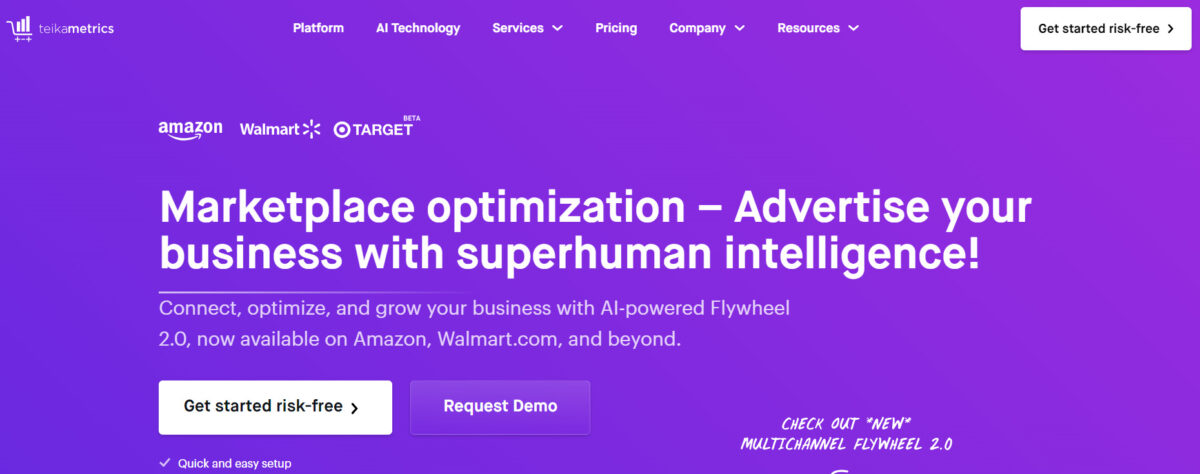
Teikametrics is an omnichannel ecommerce platform that helps businesses manage and optimize their sales and marketing activities on Amazon, Walmart, eBay, and Shopify. It offers features such as inventory management, pricing optimization, advertising management, and reporting. Teikametrics uses artificial intelligence and machine learning algorithms to optimize campaigns and improve advertising performance. The platform also offers integrations with popular advertising platforms such as Google Ads and Facebook Ads. Teikametrics provides businesses with real-time data and insights to help them make data-driven decisions and improve their ecommerce performance.
5. Optiwise.ai
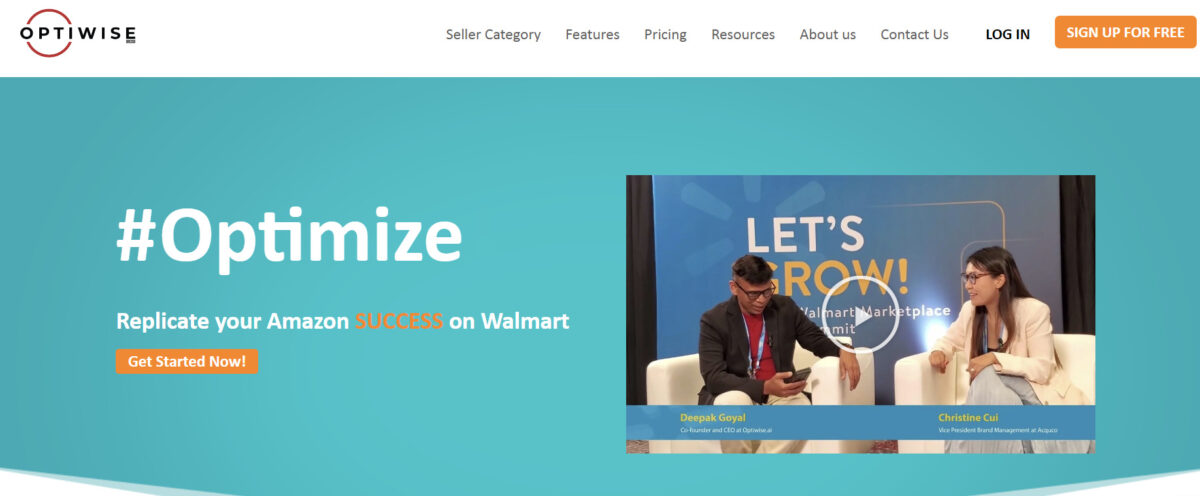
Optiwise.ai is an omnichannel ecommerce platform that helps businesses manage and optimize their sales and marketing activities on Amazon, Walmart, eBay, and other marketplaces. It offers features such as automated pricing, inventory management, advertising management, and reporting. Optiwise.ai uses artificial intelligence and machine learning algorithms to optimize campaigns and improve advertising performance. The platform also offers integrations with popular ecommerce platforms such as Shopify, Magento, and WooCommerce. Optiwise.ai provides businesses with real-time data and insights to help them make data-driven decisions and improve their ecommerce performance.
Final Thoughts
These omnichannel marketing platforms provide businesses with the tools and features they need to manage and optimize their sales and marketing activities on multiple marketplaces. By using these platforms, businesses can save valuable time and resources, improve their advertising performance, and make data-driven decisions to improve their ecommerce performance.
Frequently Asked Questions
What is an omnichannel marketing platform, and how does it benefit my marketplace business?
An omnichannel marketing platform is a tool that helps businesses manage and optimize their sales and marketing activities across multiple channels and devices. It benefits marketplace businesses by providing a unified view of their customers, improving the customer experience, and increasing the chances of conversion and annual revenue.
What are some key considerations when choosing an omnichannel marketing platform for your marketplace business?
Key considerations when choosing an omnichannel marketing platform for your marketplace business include the features and integrations it offers, the pricing plans and scalability, the level of automation and customization, and the customer support and training available.
Which marketplaces and channels does the omnichannel marketing platform support, and how can it help me manage and optimize my sales and marketing activities on those channels?
The marketplaces and channels supported by an omnichannel marketing platform can vary, but the most common ones include Amazon, Walmart, eBay, and Shopify. The platform can help businesses manage and optimize their sales and marketing activities on those channels by providing features such as automated bidding, keyword research, ad management, inventory management, and reporting.
How much does an omnichannel marketing platform cost, and what features and pricing plans should I consider when choosing one for my marketplace business?
The cost of an omnichannel marketing platform can vary depending on the features and pricing plans offered. Some platforms offer a pay-per-click model, while others charge a flat monthly fee or a percentage of sales. When choosing a platform, businesses should consider the features they need, the scalability of the platform, and the level of support and training available. It's also important to evaluate the platform's ROI and track its performance regularly.



